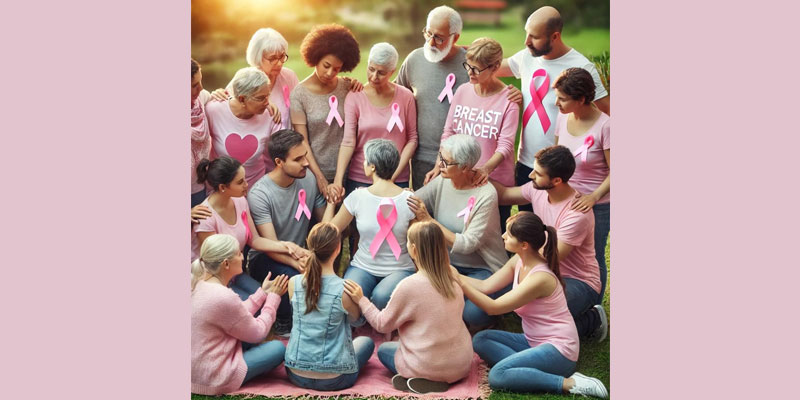Breast cancer is not just a physical condition; it impacts the emotional, mental, and social well-being of those diagnosed. As WHO’s 2024 theme reminds us,“No one needs to face breast cancer alone.” Support systems—whether from family, friends, healthcare professionals, or community groups—play a critical role in helping patients navigate their journey. Let’s explore the significance of having a support network when dealing with breast cancer.
- Emotional Support:
Being diagnosed with breast cancer can lead to overwhelming feelings of fear, anxiety, and sadness. Family and friends can offer emotional support through simple acts of listening, being present, and reassuring the patient that they are not alone. Support groups, either in person or online, allow patients to connect with others who are going through similar experiences, offering a sense of community and understanding.
- Physical Support:
Dealing with treatments such as surgery, chemotherapy, and radiation can take a toll on the body. Having someone to help with everyday tasks—cooking, cleaning, or even accompanying the patient to doctor’s appointments—can ease the physical burden. Healthcare teams are also part of this support, guiding patients through medical decisions and managing side effects.
- Mental Health Support:
Facing a life-threatening illness like breast cancer can affect mental health, leading to depression, anxiety, or post-traumatic stress. Psychological support, such as counseling or therapy, helps patients process their feelings and develop coping strategies. Some hospitals offer dedicated mental health resources for cancer patients, and seeking professional help can make a big difference.
- Financial Support:
The financial strain of cancer treatment is often one of the most challenging aspects. From surgery to medications and follow-up care, the costs can be overwhelming. Support from family, insurance, charitable organizations, and financial counselors can provide relief, allowing the patient to focus more on healing rather than worrying about expenses.
- Social Support:
Having a network of friends, colleagues, and community members helps maintain a sense of normalcy during treatment. Simple gestures, like sending encouraging messages, visiting, or organizing community drives, remind patients that they are surrounded by people who care. Social interaction also helps reduce isolation, which is common among those facing cancer.
- Healthcare Team as a Support System:
Doctors, nurses, and other medical professionals provide not just medical care but also emotional and informational support. They ensure patients understand their diagnosis, treatment options, and possible outcomes. Patients should feel comfortable discussing their concerns with their healthcare team, knowing that they are not facing this journey alone.
Conclusion:
Breast cancer is a battle that no one needs to fight in isolation. Support systems—whether family, friends, healthcare providers, or spiritual communities—are essential to a patient’s overall well-being. It’s vital that we all come together, offering our help and compassion to those affected by breast cancer, reaffirming WHO’s theme for 2024:No one needs to face breast cancer alone.

